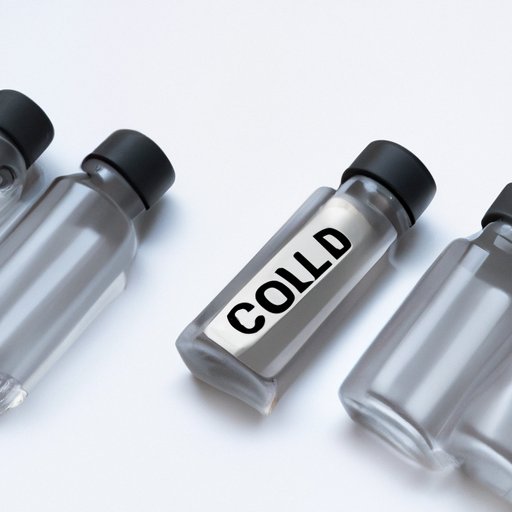Introduction
Cold sores, also known as fever blisters, are small blisters that develop on or around the lips. They are caused by the herpes simplex virus and are highly contagious. While cold sores are not life-threatening, they can be unsightly and cause discomfort. In this article, we will discuss several tips for preventing and managing cold sores, as well as several treatment options.
Tips for Preventing Cold Sores
Prevention is key when it comes to cold sores, as they can be very difficult to get rid of once they appear. Here are some tips for preventing cold sores:
Avoid Touching Your Face
The herpes simplex virus is highly contagious and can be easily spread from person to person. Avoid touching your face, especially your mouth, and avoid sharing utensils or personal items such as towels or lip balm.
Use Sunscreen Regularly
Exposure to sunlight can trigger cold sores. Use a lip balm with SPF or apply a generous amount of sunscreen to your lips to prevent outbreaks.
Practice Good Hygiene
Wash your hands regularly and avoid touching your eyes, nose, and mouth. This will help prevent the spread of the herpes simplex virus and other viruses.
Manage Stress Levels
Stress can weaken your immune system and make you more vulnerable to cold sore outbreaks. Find ways to manage stress levels, such as through exercise, meditation, or therapy.
Antiviral Medications
If you do develop a cold sore, antiviral medications can help reduce their severity and duration. Antiviral medications work by stopping the herpes simplex virus from replicating.
Explain How They Work
Antiviral medications work by targeting specific points in the herpes simplex virus’s life cycle, preventing it from replicating and spreading.
Common Types of Antiviral Medication
Common antiviral medications used to treat cold sores include acyclovir, valacyclovir, and famciclovir. These medications are available in pill or cream form and are most effective when taken early in the course of an outbreak.
When They Should Be Used
Antiviral medications are most effective when taken early in the course of a cold sore outbreak, ideally as soon as you notice the first signs of a cold sore. They may also be prescribed for people with frequent cold sore outbreaks.
Potential Side Effects
Antiviral medications can cause side effects such as nausea, vomiting, and dizziness. They can also interact with other medications, so it’s important to talk to your doctor before taking them.
Home Remedies
Many people prefer to use natural remedies to treat cold sores. While these remedies may not be as effective as antiviral medications, they can help reduce the severity and duration of cold sore outbreaks.
Discuss Natural Remedies, Such as Applying Aloe Vera and Ice to the Affected Area
Aloe vera gel can be applied directly to cold sores to help reduce inflammation and promote healing. Applying ice to the affected area can also help reduce swelling and discomfort.
Highlight Their Effectiveness in Reducing Cold Sore Outbreaks
While natural remedies may not completely get rid of cold sores, they can help reduce their severity and duration.
Discuss Potential Downsides and Side Effects
Natural remedies may not be as effective as antiviral medications in treating cold sores. They may also cause skin irritation or other side effects, especially if used improperly.
The Role of Stress in Cold Sore Outbreaks
Stress is a common trigger for cold sore outbreaks. When you’re stressed, your immune system is weakened, making you more vulnerable to infections like the herpes simplex virus.
Explain How Stress Can Trigger Outbreaks
Stress can weaken your immune system and make it easier for the herpes simplex virus to replicate and spread.
Provide Advice on How to Manage Stress Levels
Find ways to manage stress levels, such as through exercise, meditation, or therapy. Avoid overworking yourself and make sure to take breaks when needed.
Discuss Practical Strategies for Controlling Stress, Such as Exercise and Meditation
Regular exercise and meditation can help reduce stress levels, boost your immune system, and reduce the frequency and severity of cold sore outbreaks.
Covering up Cold Sores
If you’re self-conscious about your cold sores, you may want to use makeup or clothing concealers to hide them.
Provide Advice on Using Makeup or Clothing Concealers to Hide Cold Sores
Use a yellow-based concealer to neutralize the redness of your cold sore, then apply a skin-toned concealer over it to help it blend in with the rest of your skin.
Discuss Potential Downsides of Covering up Cold Sores
Makeup and clothing concealers can irritate the skin and potentially make cold sores worse. It’s important to use them properly and avoid touching the affected area.
Seeking Medical Attention
If your cold sores persist or are accompanied by other symptoms, it’s important to seek medical attention.
Provide Advice on When to See a Doctor
If your cold sores persist for more than a week, or if you develop other symptoms like fever or swollen lymph nodes, see a doctor. They may prescribe antiviral medications or other treatments.
Highlight the Importance of Seeking Medical Attention if Cold Sores Persist or Are Accompanied by Other Symptoms
Cold sores can be a sign of a weakened immune system or an underlying medical condition. If they persist or are accompanied by other symptoms, it’s important to seek medical attention.
Conclusion
Cold sores can be unsightly and uncomfortable, but they can be prevented and managed with the right strategies. Practice good hygiene, manage stress levels, and seek medical attention if cold sores persist. With the right care, you can reduce the frequency and severity of cold sore outbreaks and improve your quality of life.
